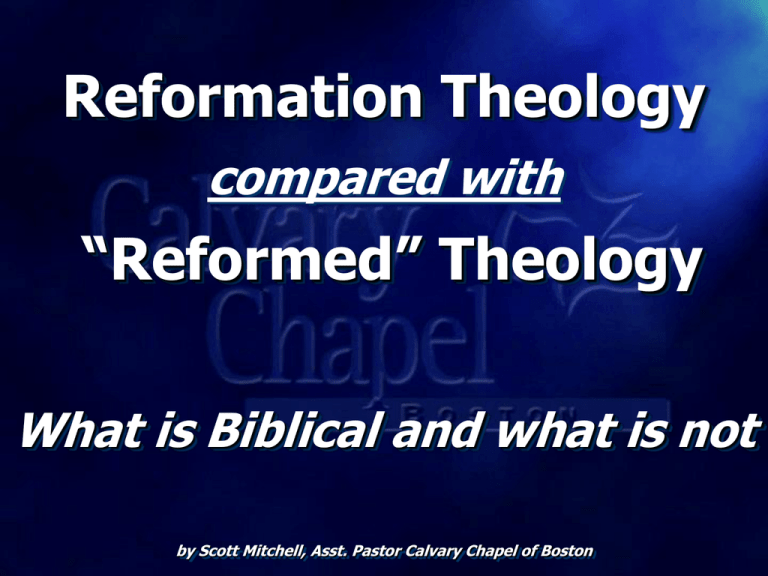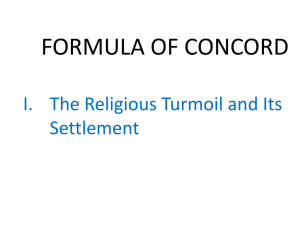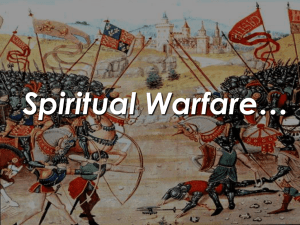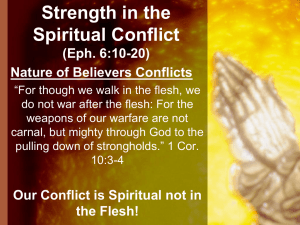Reformation vs Reformed Theology Pres.
advertisement

Reformation Theology compared with “Reformed” Theology What is Biblical and what is not by Scott Mitchell, Asst. Pastor Calvary Chapel of Boston Outline: I. 5 Solas of the Reformation II. 5 Points of Calvinism (soteriological) III. Predestination according to Calvinism IV. Biblical Points of Calvary Chapel V. Final Points of Comparison VI. Correcting Misunderstandings I. 5 Solas of the Reformation What the church “rightly” came away with 1. The Scripture (Bible) alone (Sola Scriptura) 2. Salvation by Grace alone (Sola Gratia) It is by faith in Christ that His righteousness is imputed to us 4. In Christ alone (Solus Christus) We are rescued from His wrath by His grace alone 3. Salvation by Faith alone (Sola Fide) The Bible alone is the sole authority for all matters of faith and practice Salvation…in Christ alone…for our justification and reconciliation to God the Father 5. For the Glory of God alone (Soli Deo Gloria) Salvation is of God and has been accomplished by God for His glory alone. See “What was the Protestant Reformation” at gotquestions.org II. 5 Points of Calvinism Followers of Calvin/Augustine 1. 2. 3. 4. 5. Total Depravity all elect WILL be regenerated, regeneration precedes faith Unconditional Election only the elect are saved, the non-elect are unconditionally condemned Limited Atonement Christ only died for the elect, the non-elect have no atonement Irresistible Grace the elect will respond, the non-elect can’t respond Perseverance of the Saints no one can be sure they are elect until they reach the end, the non-elect will not reach the end, thus they will show they are not the elect See “What we believe about the 5 points of Calvinism” John Piper Desiring God Website III. Predestination according to Calvin “By predestination we mean the eternal decree of God, by which He determined with Himself whatever He wished to happen with regard to every man. All are not created on equal terms, but some are preordained to eternal life, others to eternal damnation; and, accordingly, as each has been created for one or other of those ends, we say that he has been predestined to life or death.” Quote from John Calvin, Institutes of the Christian Religion, book 3, chap 21, sec 5, 206. III. Predestination according to Calvin cont. “We say, then, that Scripture clearly proves this much, that God by His eternal and immutable counsel determined once and for all those whom it was His pleasure one day to admit to salvation, and those whom, on the other hand, it was His pleasure to doom to destruction. We maintain that His counsel, as regard the elect, is founded on His free mercy, without any respect to human worth, while those whom He dooms to destruction are excluded from access to life by a just and blameless, but at the same time incomprehensible judgment.” Quote from John Calvin, Institutes of the Christian Religion, book 3, chap 21, sec 7, 210-211. III. Predestination according to Calvin cont. “Predestination seems to cast a shadow on the very heart of human freedom. If God has decided our destinies from all eternity, (unconditionally) that strongly suggests that our free choices are but charades, empty exercises in predetermined placating. It is as though God wrote the script for us in concrete and we are merely carrying out His scenario.” Quote from R.C.Sproul, Chosen by God, 51. III. Predestination according to Calvin cont. “It was certainly loving of God to predestine the salvation of His people, those the Bible calls the "elect or chosen ones." It is the nonelect that are the problem. If some people are not elected unto salvation then it would seem that God is not all that loving toward them. For them it seems that it would have been more loving of God not to have allowed them to be born. That may indeed be the case.” Quote from R.C.Sproul, Chosen by God, 32. III. Predestination according to Calvin cont. “Though there is strong sentiment to speak of single predestination only, and to avoid any discussion of double predestination, we must still face the questions on the table. Unless we conclude that every human being is predestined to salvation, we must face the flip side of election. If there is such a thing as predestination at all, and if that predestination does include all people, we must not shrink from the necessary inference that there are two sides to predestination. It is not enough to talk about Jacob; we must also consider Esau.” Quote from R.C.Sproul, Chosen by God, 141. IV. Biblical Points of Calvary Chapel I. Saving faith in Christ always and immediately results in regeneration and any and all lost sinners can believe in Christ and be born again (Jn. 1: 10-13, 20: 30-31) - God draws sinners to Jesus Christ by His Holy Spirit to make this choice by faith - Saving faith in Christ is before and results in the regeneration (born again) of the believer IV. Biblical Points of Calvary Chapel II. God desires all men to be saved and has determined that all can and will be saved on condition they believe in Jesus Christ (Jn. 3: 15-18, 1 Tim. 2: 3-4, Acts 16: 27-31) - - The condition required to be saved is exercising faith in Christ All can believe so all can be saved IV. Biblical Points of Calvary Chapel III. Christ died savingly, redemptively, or propitiously for all the sins of all sinners, faith makes the work of Christ effective in the life of those who believe (1 Jn. 2:2, 2 Cor. 5: 14-15) - - There is no sinner beyond Christ’s redemptive work of the cross Christ died for all the sins of all sinners IV. Biblical Points of Calvary Chapel IV. God calls all lost sinners to a saving faith in Jesus Christ through a Gospel proclamation and by believing the Gospel all lost sinners can be saved (Rom. 1: 16, 1 Cor. 15: 1-3) - The call of the gospel can be received or rejected based on the choice of the sinner - all sinners are called to faith in Christ and will be saved if they believe in the gospel IV. Biblical Points of Calvary Chapel V. All those who believe in Jesus Christ and are thus saved (regenerated and justified) are called to live a life to please, honor, and glorify the Lord and that such a life (although possible for and expected of the believer) is not inevitable for the believer (Rom. 12: 1-2, Eph. 4: 1-3, 2 Pet. 1: 1-10) - - The assurance of salvation for believers is found in their abiding in Christ, not apart from it All who are saved should and can live a godly life, but living a godly life is not inevitable for the saved V. Final Points of Comparison Regeneration is required for and results in faith in Christ - Calvin Faith in Christ is required for and results in regeneration - Bible Election is required for and results in faith in Christ - Calvin Faith in Christ is required for and results in election - Bible Christ died only for the sins of the elect – Calvin Christ died for the sins of all the lost - Bible Only the elect are efficaciously called to salvation through faith in Christ - Calvin All of the lost are truly offered salvation through faith in Christ - Bible Only the elect will persevere in holiness and faith to the end - Calvin Perseverance in righteousness to the end is the legitimate goal of all believers – Bible VI. Correcting Misunderstandings Not being a Calvinist, does not make a person an Arminian, nor the opposite, it is a non-sequitur Both Theologies are extreme systems It is not required to fit into one or the other system Predestination is not a word owned by Calvinists It is used in the NT in contexts removed from Calvinist’s interpretations “Election” would also fall under this same criteria of context Faith is not considered a “work” in the Bible Man is said to be saved by it, and he can’t be saved by works Paul “contrasts” both faith and works in his argument on justification by faith apart from works VI. Correcting Misunderstandings cont In Eph 2:8, the word faith is not the “gift” spoken of The gift “refers not to faith or grace, but to the act of being saved by grace conditioned on faith on our part” (Robertson’s Word Pictures) The gift is “not faith, but the salvation” (Vincent’s Word Studies) The gift is “not your faith”, the gift of God is “of your salvation” (Henry Alford Greek NT) “The salvation is not an achievement but a gift, and a gift from none other than God” (Expositors Greek NT by Nicholl) The word “gift” (doron Strong's #1435) under heading number 1, “of salvation by grace as the “gift” of God” (Vine’s Expository Dictionary of NT Words) VI. Correcting Misunderstandings cont In Eph 2:8, the word faith is not the “gift” spoken of A fuller explanation: The words, "through faith" speak of the instrument or means whereby the sinner avails himself of this salvation which God offers him in pure grace… The word "that" is touto, "this," a demonstrative pronoun in the neuter gender. The Greek word "faith" is feminine in gender and therefore touto could not refer to "faith." It refers to the general idea of salvation in the immediate context. The translation reads, "and this not out from you as a source, of God (it is) the gift." That is, salvation is a gift of God. It does not find its source in man. Furthermore, this salvation is not "out of a source of works." This explains salvation by grace. It is not produced by man nor earned by him. It is a gift from God with no strings tied to it. Paul presents the same truth in Romans 4:4, 5 when speaking of the righteousness which God imputed to Abraham, where he says: "Now, to the one who works, his wages are not looked upon as a favor but as that which is justly or legally due. But to the one who does not work but believes on the One who justifies the impious, his faith is computed for righteousness.“ (Wuest’s Word Studies in NT) VI. Correcting Misunderstandings cont The Bible never has regeneration prior to faith, it always follows faith Rom 4:3 (quoted of Abraham in Gen 15:6, foundational to all Paul's teaching on justification by faith) Eph 2:8 (note previous grammatical presentation, faith not the “gift”) Gal 6:15 (new creation after explaining faith required for justification) 1 Pet 1:23 (born again by the Word of God, faith comes by hearing the Word of God, Rom 10:17) John 3 The explanation by the Son v3 – “unless you are born again, you can’t see the kingdom of God” – Jesus; truth stated! V9 – “how can these things be?” – Nichodemus; question asked about that truth. V15, 16, 18 – “whosoever believes” – Jesus; answer given! The Bible is the ONLY authoritative teaching on the doctrines of GRACE It has appeared to all men (Titus 2:11) Man is saved by it (Eph 2:8) Faith is according to it (4:16) Man is justified by it (Rom 3:24) It is contrasted with works (Rom 11:6) It can be received in vain (2 Cor 6:1) Redemption and forgiveness is from it (Eph 1:7) Finally The church should not be divided because of Calvinism – either from Calvinists or those opposed to it. The church should seek to operate in unity for the cause of Christ. Whether someone wants to believe in the doctrines as they are understood by Calvinists is their own choice and should not be a cause of division. Believers should be able to fellowship with each other in Christ without their views on predestination and the 5 points of Calvinism becoming more important than Christ. Those leaders who came out of the Reformation were not all agreed on predestination, freewill and other non-essential doctrines of the faith. And since we all like to adhere to 5 solas that were the foundation to the Reformation period, we should at least be willing to remain in unity on these beliefs and not divide on the particulars of Calvinism.








